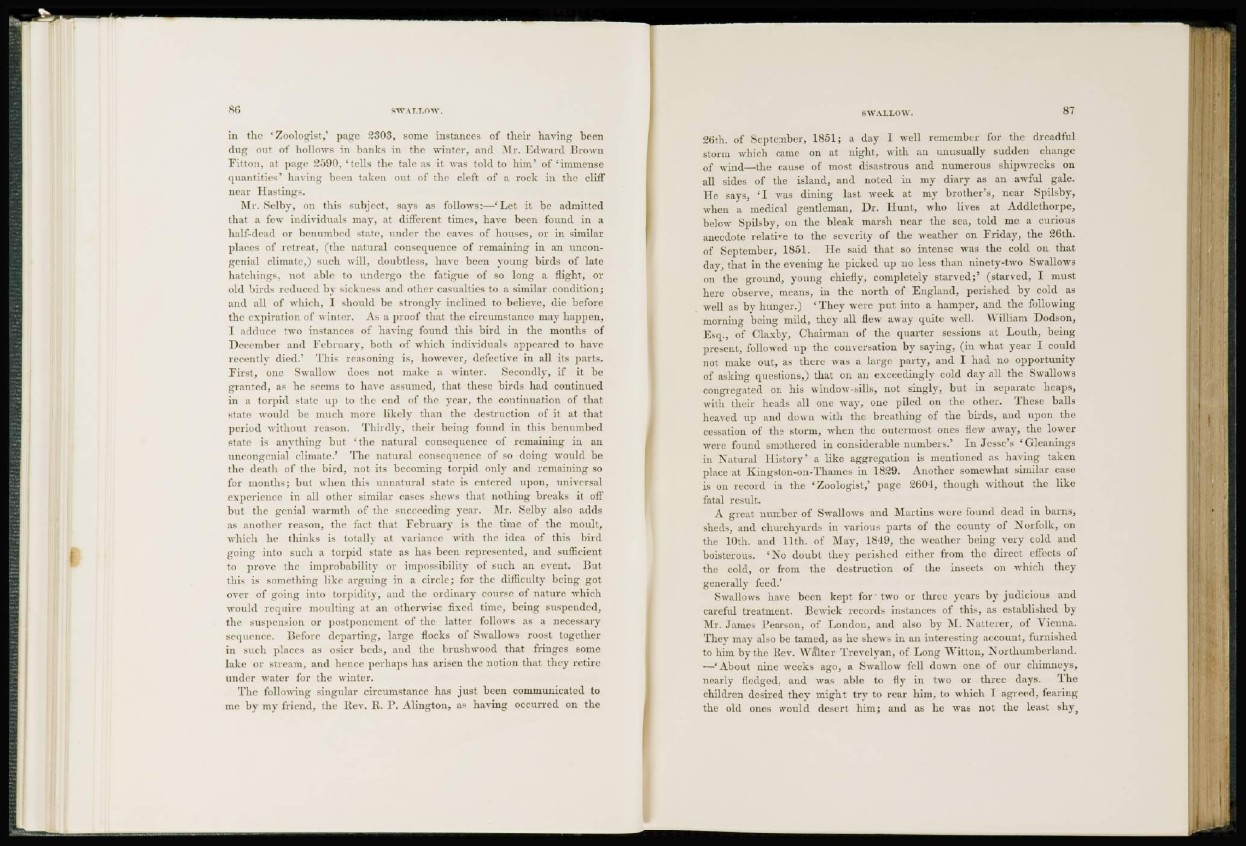
in the 1 Zoologist,' page 2303, some instances of their having been
dug out of hollows in hunks in the winter, and Air. Edward Brown
Fitton, at page 2590, 'tells the tale as it was told to him' of 'immense
quantities' having been taken out of the cleft of a rock in the cliff
near Hastings.
Mr. Selbv, on this subject, says as follows:—'Let it be admitted
that a few individuals may, at different times, have been found in a
half-dead or benumbed state, under the eaves of houses, or in similar
places of retreat, (the natural consequence of remaining in an uncongenial
climate,) such will, doubtless, have been young birds of late
hatchings, not able to undergo the fatigue of so long a flight, or
old birds reduced by sickness and other casualties to a similar condition;
and all of which, I should be strongly inclined to believe, die before
the expiration of winter. As a proof that the circumstance may happen,
I adduce two instances of having found this bird in the months of
December and February, both of which individuals appeared to have
recently died.' This reasoning is, however, defective in all its parts.
First, one Swallow" docs not make a winter. Secondly, if it be
granted, as he seems to have assumed, that these birds had continued
in a torpid state up to the end of the year, the continuation of that
state would be much more likely than the destruction of it at that
period without reason. 'Thirdly, their being found in this benumbed
state is anything but 'the natural consequence of remaining in an
uncongenial climate.' The natural consequence of so doing would be
the death of the bird, not its becoming torpid only and remaining so
for months; but when this unnatural state is entered upon, universal
experience in all other similar cases shews that nothing breaks it off
but the genial warmth of the succeeding year. Mr. Sclby also adds
as another reason, the fact that February is the time of the moult,
which he thinks is totally at variance with the idea of this bird
going into such a torpid state as has been represented, and sufficient
to prove the improbability or impossibility of such an event. But
this is something like arguing in a circle; for the difficulty being got
over of going into torpidity, and the ordinary course of nature which
would require moulting at an otherwise fixed time, being suspended,
the suspension or postponement of the latter follows as a necessary
sequence. Before departing, large flocks of Swallows roost together
in such places as osier beds, and the brushwood that fringes some
lake or stream, and hence perhaps has arisen the notion that they retire
under water for the winter.
The following singular circumstance has just been communicated to
me by my friend, the Rev. R. P. Alington, as having occurred on the
26th. of September, 1851; a day I well remember for the dreadful
storm which came on at night, with an unusually sudden change
of wind—the cause of most disastrous and numerous shipwrecks on
all sides of the island, and noted in my diary as an awful gale.
He says, ' I was dining last week at my brother's, near Spilsby,
when a medical gentleman, Dr. Hunt, who lives at Addlethorpc,
below Spilsby, on the bleak marsh near the sea, told mc a curious
anecdote relative to the severity of the weather on Friday, the 26th.
of September, 1851. He said that so intense was the cold on that
day, that in the evening he picked up no less than ninety-two Swallows
on the ground, young chiefly, completely starved;' (starved, I must
here observe, means, in the north of England, perished by cold as
well as by hunger.) 'They were put into a hamper, and the following
morning being mild, they all flew away quite well. William Dodson,
Esq., of Claxby, Chairman of the quarter sessions at Louth, being
present, followed up the conversation by saying, (in what year I could
not make out, as there was a large party, and I had no opportunity
of asking questions,) that on an exceedingly cold day all the Swallows
congregated on his window-sills, not singly, but in separate heaps,
with their heads all one way, one piled on the other. These balls
heaved up and down with the breathing of the birds, and upon the
cessation of the storm, when the outermost ones flew away, the lower
were found smothered in considerable numbers.' In Jesse's 'Gleanings
in Natural History' a like aggregation is mentioned as having taken
place at Kingston-on-Thames in 1829. Another somewhat similar case
is on record in the 'Zoologist,' page 2604, though without the like
fatal result.
A great number of Swallows and Martins were found dead in barns,
sheds, and churchyards in various parts of the county of Norfolk, on
the 10th. and 11th. of May, 1849, the weather being very cold and
boisterous. 'No doubt they perished either from the direct effects of
the cold, or from the destruction of the bisects on which they
generally feed.'
Swallows have been kept for two or three years by judicious and
careful treatment. Bewick records instances of this, as established by
Mr. James Pearson, of London, and also by M. Natterer, of Vienna.
They may also be tamed, as he shews in an interesting account, furnished
to him by the Rev. Walter Trevelyan, of Long Witton, Northumberland.
—'About nine weeks ago, a Swallow fell down one of our chimneys,
nearly fledged, and was able to fly in two or three days. The
children desired they might try to rear him, to which I agreed, fearing
the old ones would desert him; and as he was not the least shy